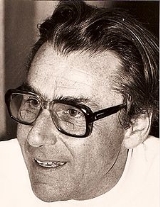
Hans Kuhn
Encyclopedia
Hans Kuhn is a Swiss chemist
. He is professor emeritus for physical chemistry
and former scientific director at the Max Planck Institute for Biophysical Chemistry (Karl Friedrich Bonhoeffer Institute)
in Göttingen
.
, Switzerland
. He studied chemistry at the ETH Zürich and worked for his doctorate at University of Basel under the guidance of Werner Kuhn
(not related). He received his habilitation in 1946. From 1946 until 1947 he worked as a postal doctoral fellow with Linus Pauling
at Caltech
in Pasadena
and in 1950 with Niels Bohr in Copenhagen
. In 1951, he became professor at the University of Basel. He was appointed in 1953 as professor and director of the Institute of Physical Chemistry of the Philipps University of Marburg where he stayed until 1970. Then he was at the Max Planck Institute for Biophysical Chemistry (Karl Friedrich Bonhoeffer Institute)
in Göttingen
as director of the department 'Molecular Systems Assembly' until his retirement 1985.
Chemist
A chemist is a scientist trained in the study of chemistry. Chemists study the composition of matter and its properties such as density and acidity. Chemists carefully describe the properties they study in terms of quantities, with detail on the level of molecules and their component atoms...
. He is professor emeritus for physical chemistry
Physical chemistry
Physical chemistry is the study of macroscopic, atomic, subatomic, and particulate phenomena in chemical systems in terms of physical laws and concepts...
and former scientific director at the Max Planck Institute for Biophysical Chemistry (Karl Friedrich Bonhoeffer Institute)
Max Planck Institute for Biophysical Chemistry
The Max Planck Institute for Biophysical Chemistry in Göttingen is a research institute of the Max Planck Society. Currently, 812 people work at the Institute, 353 of them are scientists....
in Göttingen
Göttingen
Göttingen is a university town in Lower Saxony, Germany. It is the capital of the district of Göttingen. The Leine river runs through the town. In 2006 the population was 129,686.-General information:...
.
Curriculum
Hans Kuhn was born in BerneBerne
The city of Bern or Berne is the Bundesstadt of Switzerland, and, with a population of , the fourth most populous city in Switzerland. The Bern agglomeration, which includes 43 municipalities, has a population of 349,000. The metropolitan area had a population of 660,000 in 2000...
, Switzerland
Switzerland
Switzerland name of one of the Swiss cantons. ; ; ; or ), in its full name the Swiss Confederation , is a federal republic consisting of 26 cantons, with Bern as the seat of the federal authorities. The country is situated in Western Europe,Or Central Europe depending on the definition....
. He studied chemistry at the ETH Zürich and worked for his doctorate at University of Basel under the guidance of Werner Kuhn
Werner Kuhn
Werner Kuhn is a Swiss physical chemist who developed the first model of the viscosity of polymer solutions using statistical mechanics. He is known for being the first to apply Boltzmann's entropy formula:S = k \log W \!...
(not related). He received his habilitation in 1946. From 1946 until 1947 he worked as a postal doctoral fellow with Linus Pauling
Linus Pauling
Linus Carl Pauling was an American chemist, biochemist, peace activist, author, and educator. He was one of the most influential chemists in history and ranks among the most important scientists of the 20th century...
at Caltech
California Institute of Technology
The California Institute of Technology is a private research university located in Pasadena, California, United States. Caltech has six academic divisions with strong emphases on science and engineering...
in Pasadena
Pasadena, California
Pasadena is a city in Los Angeles County, California, United States. Although famous for hosting the annual Rose Bowl football game and Tournament of Roses Parade, Pasadena is the home to many scientific and cultural institutions, including the California Institute of Technology , the Jet...
and in 1950 with Niels Bohr in Copenhagen
Copenhagen
Copenhagen is the capital and largest city of Denmark, with an urban population of 1,199,224 and a metropolitan population of 1,930,260 . With the completion of the transnational Øresund Bridge in 2000, Copenhagen has become the centre of the increasingly integrating Øresund Region...
. In 1951, he became professor at the University of Basel. He was appointed in 1953 as professor and director of the Institute of Physical Chemistry of the Philipps University of Marburg where he stayed until 1970. Then he was at the Max Planck Institute for Biophysical Chemistry (Karl Friedrich Bonhoeffer Institute)
Max Planck Institute for Biophysical Chemistry
The Max Planck Institute for Biophysical Chemistry in Göttingen is a research institute of the Max Planck Society. Currently, 812 people work at the Institute, 353 of them are scientists....
in Göttingen
Göttingen
Göttingen is a university town in Lower Saxony, Germany. It is the capital of the district of Göttingen. The Leine river runs through the town. In 2006 the population was 129,686.-General information:...
as director of the department 'Molecular Systems Assembly' until his retirement 1985.

